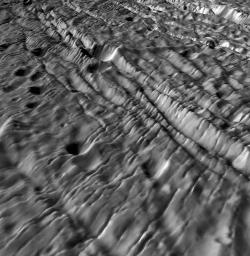
|
Ancient Cratered Terrains on Enceladus - A Complex Deformation History
- Click the image above for a larger view
- Full-Res JPEG (864 x 884) (141.0 kB)
- Full-Res TIFF (864 x 884) (764.8 kB)
Caption:
The topography of planetary surfaces tells us much about the geologic history and forces involved, and volcanically active Enceladus is no exception. New topographic maps give us a fresh unprecedented look at this tortured moon. This perspective view shows the oldest most heavily cratered terrains on the surface. Long ridges and grooves and numerous younger narrow parallel fractures cut across many of these craters, showing that even this ancient terrain has not escaped the extensive tectonic deformation that has wracked this small icy moon. The larger craters in the foreground are typically 2 kilometers across and a few hundred meters deep. This perspective view was constructed from digital elevation models produced by Dr. Paul Schenk ( http://www.lpi.usra.edu/lpi/schenk/ ) at the Lunar and Planetary Institute in Houston, TX, based on stereo and shape-from-shading analysis of Cassini images acquired in March 2005. Vertical relief has been exaggerated by a factor of 10 to aid interpretation.
Background Info:
The raw data from which this product was developed were retrieved from the Planetary Data System's Cassini archives. The Cassini-Huygens mission is a cooperative project of NASA, the European Space Agency and the Italian Space Agency. The Jet Propulsion Laboratory, a division of the California Institute of Technology in Pasadena, manages the mission for NASA's Science Mission Directorate, Washington, D.C. The Cassini orbiter and its two onboard cameras were designed, developed and assembled at JPL. The imaging operations center is based at the Space Science Institute in Boulder, Colo. ( http://ciclops.org )
Cataloging Keywords:
| Name | Value | Additional Values |
|---|---|---|
| Target | Enceladus | |
| System | Saturn | |
| Target Type | Satellite | |
| Mission | Cassini-Huygens | |
| Instrument Host | Cassini Orbiter | |
| Host Type | Orbiter | |
| Instrument | Imaging Science Subsystem (ISS) | |
| Detector | ||
| Extra Keywords | Crater, Grayscale, Volcano | |
| Acquisition Date | ||
| Release Date | 2008-03-25 | |
| Date in Caption | ||
| Image Credit | NASA/JPL/Space Science Institute/Universities Space Research Association/Lunar & Planetary Institute | |
| Source | photojournal.jpl.nasa.gov/catalog/PIA10351 | |
| Identifier | PIA10351 | |
